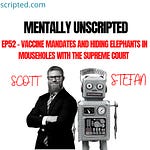In today's episode, Myron Weber from Mental Supermodels joins us a fascinating discussion on whether democracy is, to borrow a phrase from Marx, "the opiate of the masses," that's dulling our awareness that the United States is becoming less constitutional, less federal, and less republican. And by republican, we mean the form of government, not the political party.
We had a great discussion that will give you a lot to think about regarding democracy and the direction in which the U.S. is heading.
As always, we want to build a community around Mentally Unscripted. So, share this episode with your friends and interact with us at MentallyUnscripted.com.
And remember, the conclusion you reach is less important than the process you follow to get there.
About Myron
Myron Weber leads the Northwood Advisors team to design and deliver high ROI solutions to business needs:
Solving complex business data problems in operations, sales, and marketing.
BI and Data Warehouse design and development.
Building custom applications to fill gaps not covered by enterprise systems.
Connect with Myron on LinkedIn or learn more at www.NorthwoodAdvisors.com
You can also listen to Myron on Mental Supermodels. He and his co-host, Jeremy, explore the theory and practice, the art and science of mental modeling for problem-solving and decision making in business and life.
You can listen to Mental Supermodels on all major podcast platforms.
Resources
Winston Churchill preposition quote (as Myron mentioned, this quote is disputed but it’s still good)
What Does ‘Constitutional Interpretation’ Mean, Anyway?, by Scott Grayson
Popular Sovereignty, Judicial Supremacy, and the American Revolution: Why the Judiciary Cannot be the Final Arbiter of Constitutions, by William J. Watkins, Jr.
The Myth of the Rule of Law, by John Hasnas
Aristotle’s Philosophy of Government
Democracy, the God that Failed, by Hans-Hermann Hoppe
Sapiens: A Brief History of Humankind, by Yuval Noah Harari
Mental Models
Making distinctions
False dichotomy
Inherent flaws/Fatal flaw
Structural thinking
Analogical thinking
High stakes & reversibility
Root cause analysis
Incentives matter
Top Takeaways
The distinction between whether the U.S. is a republic or a democracy is a false dichotomy. Democracy describes the nature of voting, while republic refers to the extent to which public policy reflects the will of the voters.
The built-in mechanisms for government in the U.S. are the Constitution, federalism, republicanism, and democracy. Over time, the bureaucratic and intelligence state became another mechanism for the government that wasn't intended by the founders. Democracy is the opiate of the masses that hides the diminishing role the Constitution, federalism, and republicanism play in our current system of government.
There is a large group of unelected bureaucrats that exert a lot of control over the day-to-day life of the citizenry.
The power and money involved in government distort democracy by turning elections into high-stakes contests that incentivize power-hungry people to do anything necessary to win office.
Engage with Scott and Stefan on the Twitter thought control machine and the Mentally Unscripted Substack.
We're also on Odysee.
Follow Scott at Strength and Reason and on DESO.
Here’s How to have stimulating conversations on blistering hot topics without fighting.
It's easier than you think.
Download How to Never Argue Again (Unless you Want To) at Mentally Unscripted and discover the secret "Go Meta" approach that makes any topic fair game.
It's FREE (for now) and worth hundreds in therapy.
Cheers!
Podcast theme music by Transistor.fm. Learn how to start a podcast here.











